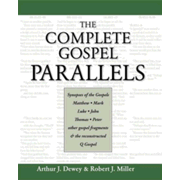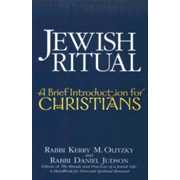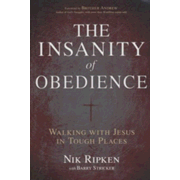 |
The Complete Gospel Parallels By Arthur J. Dewey & Robert J. Miller |
Using material from an independent source, Luke wove into his gospel a marked progression in the growth of Jesus. Therefore, the view he provided for his early church communities related to them the religious customs of the day. This religious fulfillment according to the Law, familiar to the Jews of his congregations, also spelled out clarity for those Gentiles who may not have known the customs. In particular, we note the transitional statement wherein Jesus was described as having grown strong and wise with God watching over him. This statement bridges all of the readers, whether Jew or Gentile, from the infant dedication narrative found just prior to this story.
However, we first must note the omission of a story about an angel’s warning to Joseph as recorded in the Gospel According to Saint Matthew, and the subsequent family flight to Egypt. Rather than writing of such, our Lukan gospel writer jumped directly to our Lord’s early teen years. Given the omission and leap forward in time, the gospel record presents several possibilities. First, we might assume that Luke did not know about the flight to Egypt. Second, we may ask whether Luke had the story. An editorial choice was made. Possibly some choices were made between the two accounts… given a finite amount of parchment available to write this total gospel witness. If the latter is most likely, that we may ask, “What character of today’s reading would recommend it for inclusion for Luke’s churches, while the writer deliberately chose not to include the Egyptian flight story?” In answer, we ponder, “Could the difference between the gospels reveal the writer’s spiritually driven priority in relating the biography of Jesus?”
You see, no matter whether this result was based upon an independent exclusive source or... considering the subject importance, Luke went directly to tell his audience of Jesus’ first act as an adult. I see the possibility of his having an exclusive eye-witness account available as unlikely, since the gospel was written some 70 years after the actual event. Few, if any first-hand witnesses would still be alive at the time of the writing. For this reason, given the expense and scarcity of parchment I consider that the hard choice was made. This story must have held greater relevancy for Luke, rather than relating concerning our Lord’s travel to Egypt as an infant. When making these hard choices under the guidance of the Holy Spirit, Luke deliberately chose to tell this particular story.
We must also ask at this point, “If Jesus is the Son of God, why did the gaining of wisdom need to be done? Wouldn’t he already possess infinite knowledge?” However, when questioning... consider this. With Jesus existing as fully human and fully God, we need remember that scripture said that he, as the Christ had “emptied himself”. A reasonable answer thus could be found…
“For what things are written of Him as a man shew the manner of the emptying. For it were a thing impossible for the Word begotten of God the Father to admit ought like this into His own nature: but when He became flesh, even a man like unto us, then He is born according to the flesh of a woman, and is said also to have been subject to the things that belong to man’s state: and though the Word as being God could have made His flesh spring forth at once from the womb unto the measure of the perfect man, yet this would have been of the nature of a portent: and therefore He gave the habits and laws of human nature power even over His own flesh.” (Cyril of Alexandria. (1859). A Commentary upon the Gospel according to S. Luke. (R. P. Smith, Trans.) (p. 29). Oxford: Oxford University Press.)
Therefore by the will of God, the Christ… the Word of God born as a human child, voluntarily emptied himself of infinite wisdom. Luke described to his churches that in the Jewish culture of the day, a male child grew twelve years of age and then acquired the required maturity to be called a “son of the Law”. From the Hebrew scriptures we thus find that the Jews recognized these progressive stages of youthful development first as: new-born babe (as read in Isa. 9:6); nursing or suckling (Isa. 11:8); nursing, but then calling for solid food (Lam. 4:4); the weaned (Isa. 28:9); as child clinging to mother (Jer. 40:7); becoming firm and strong (Isa. 7:14); and finally… the youth matured as an adult (Isa. 31:8). Thus this was the progression made as described by humans, and the trip described wherein the child Jesus was noted as arriving into maturity.
 |
Jewish Ritual: A Brief Introduction for Christians By Rabbi Kerry M. Olitzky and Rabbi Daniel Judson |
Was this story then describing a trip to celebrate this rite of passage, similar in many respects to our historic Christian confirmation ritual? I offer it as so. The traditions of Bar Mitzvah (in the Hebrew בַּר מִצְוָה) are still considered today as Jewish coming-of-age rituals. The term translates to "son of commandment" However, in rabbinical usage the phrase “subject to” is added. The term thus translates as to 'a son subject to the Law'. Although the term commonly refers to the ritual, in fact the phrase originally referred to the person performing the ritual.
According to present Jewish practice, when male children arrive at 13 years-old, they become accountable for their own actions. Prior to reaching the age of bar mitzvah, the child's parents hold the religious responsibility for the child's actions. However, after bar mitzvah is completed, the youth bears their own responsibility for obedience to Jewish law, ritual and ethics. The youth thus becomes able to participate in all areas of Jewish community life. The father of the candidate then gives thanks to God that he is no longer punished for his child's sins. Also, the newly-recognized adult can be included in a "minvan” (prayer quorum), and can also lead prayer and other religious services in the family and the Hebrew community.
Human Expectations!
Given these historical traditions yet present, I therefore take editorial privilege by offering that according to parental expectations written here, Jesus went to Jerusalem take his rightful place in the “company that traveled with him”. He went to Jerusalem as a child having studied and prepared for the ritual, and subsequently received ritual adulthood. After appropriate celebration, therefore, Jesus was expected to take his place in the household economy… i.e. he was to follow Joseph’s trade, a trade that had been parentally selected for him, a trade which the “company” was known to possess.
However, here we likely find scriptural evidence that the parental couple had long-forgotten the prophecy of Simeon as stated previously in this same gospel. Luke related that the family had left Jerusalem to return home, but without their realizing… Jesus exercised his right as an adult to remain in prayer quorum. After a day of travel toward their home, his parents discovered him missing from their family. Thus the family became distraught. They considered him as lost in what could be a dangerous place, and returned worried to Jerusalem.
Any caring parent chills at the thought of a lost child. We know that many horrid thoughts run through a worried parent’s mind. Many might ask ourselves today, “How could this young man… this Jesus… this Son of God… be so callous to his parents?’ We might even say that we understand how this could happen… that some of our own children may be so callous that they would toss aside parental oversight during the teen years… sneaking away to do what they will and worry us. We might also say that we have seen many teens who receive catechism, disappear from Church after they receive Confirmation…. and are not found in the family of the congregation. But this Jesus… this is the perfect Son? How can this be?
I say to those who question in such manner that it was not that he was insensitive to his earthly parents… but from his study of Hebrew Scriptures he had become keenly aware of his heavenly Father’s matters ( in the Greek the word translates “things” ). He thus, as an adult within his culture, told his earthly parents that he was to be about the business of his heavenly Father. By doing so he began fulfilling that future to which he was called. With being found by his earthly parents, and their hearing the statement from their child who was now considered as adult, we may consider that Joseph and Mary’s words of anxiety were lessened and even stopped. However, out of respect… and the human need for further growth and nurture, Jesus returned with them to Nazareth. Our Lord most likely worked many years thereafter with his father and family. Hometown and family life continued stable for a period of nearly twenty years, until his baptism by his cousin John… but this interim time is a period about which the scripture falls silent. Some non-canonical stories had circulated about our Lord's teen life around the time of the Lukan writing, but either these were not verifiable or of sufficient importance to be included in the gospel record. Consequently, the Lukan text provides us only with this very precise, and brief, prophetic look into a spiritually formative event in the life of Jesus. The transitional statement at the end to today’s reading thus tells us in closing…“And Jesus increased in wisdom and in stature, and in favor with God and man.”
Click Here To Visit Pastor's Website
This gospel thus sets us as readers or hearers in a very knowledgeable place in the modern Church. We are by the Spirit, poised for that which is to come. Consider this! In this unfolding story given by the power of the Holy Spirit, the writer placed us as witnesses to the only known record of Jesus’ coming of age. We see that Luke slowly, yet artfully built the tension of the history he was relating that described the saving act for which our Lord came into this world. This young man he told about... this Jesus… was surely known as truly human. The history then continued to reveal his ministry, his death and his Resurrection... and by the power of the Holy Spirit, he was thus truly revealed as the only Begotten Son of God. Both as human and divine, therefore, he created a pathway for those who would follow. This was the purpose of the telling of this story in Luke… so it was written… and so it is even yet.
May the Lord guide your ministry!






